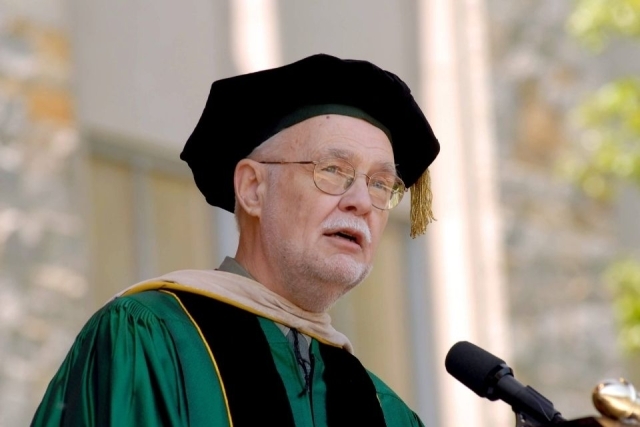
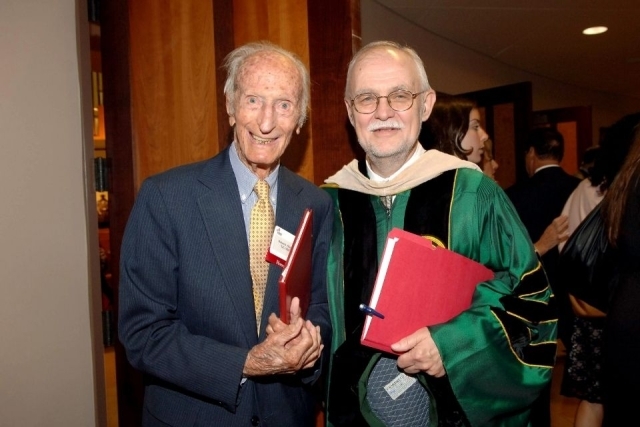
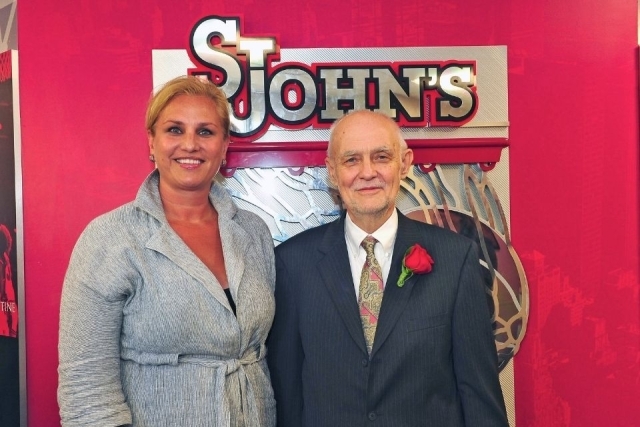
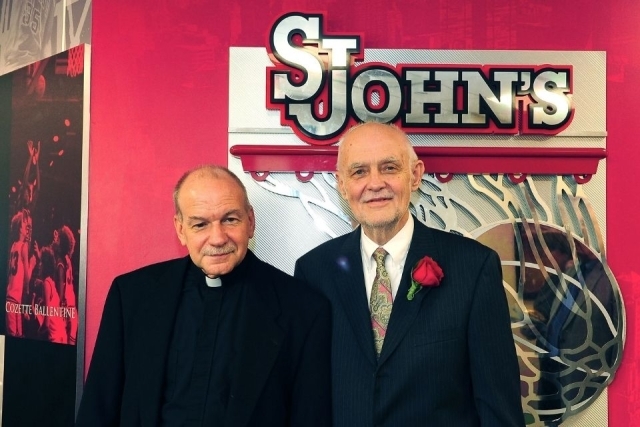
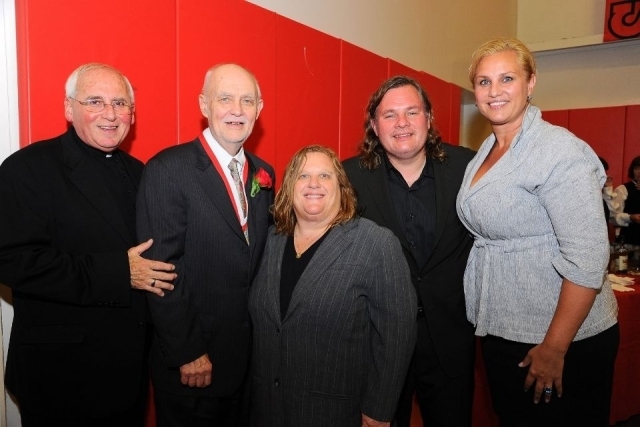
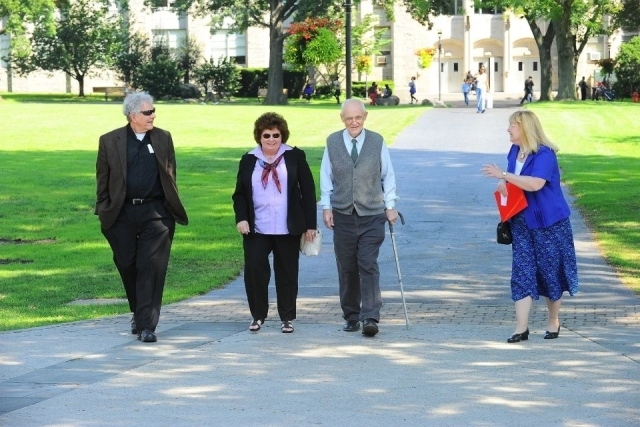
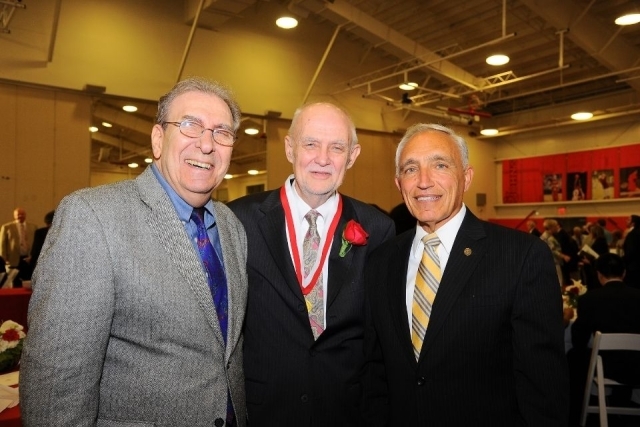
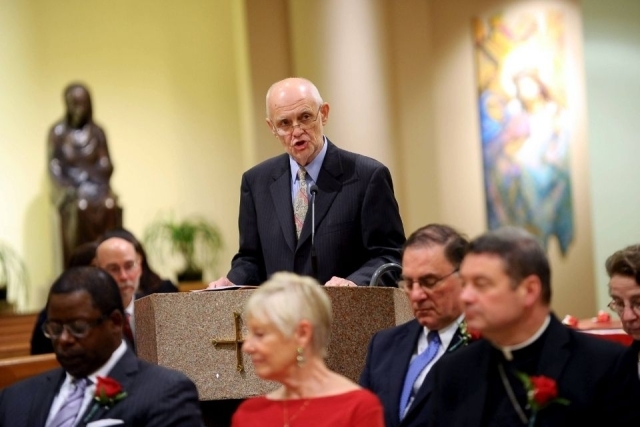
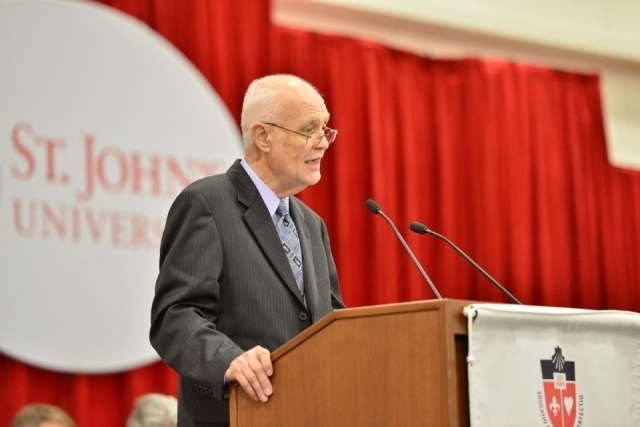
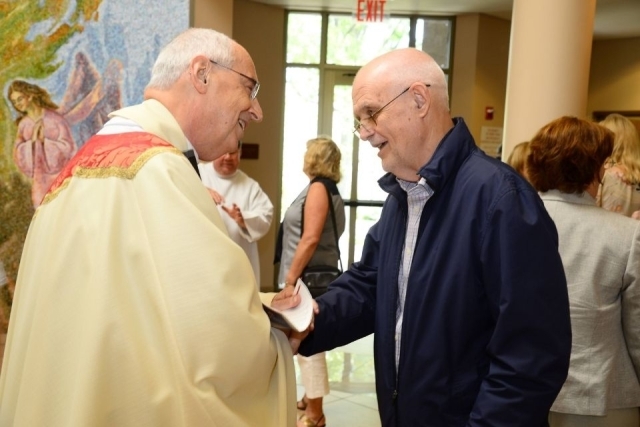
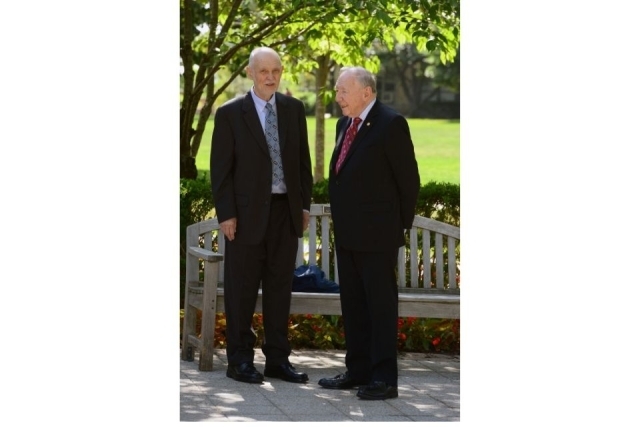
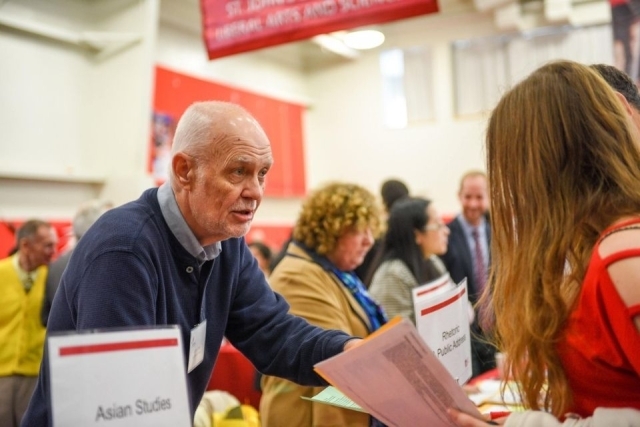
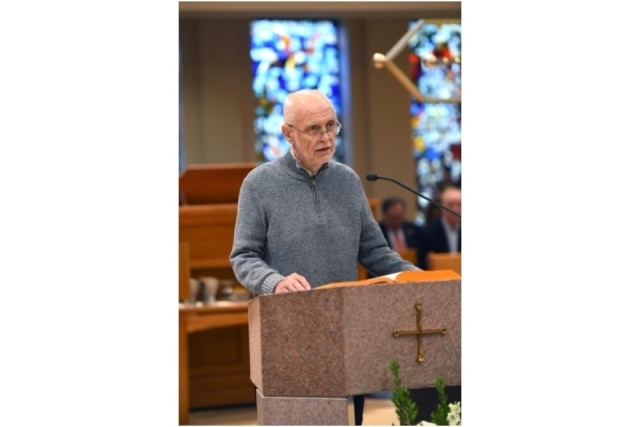
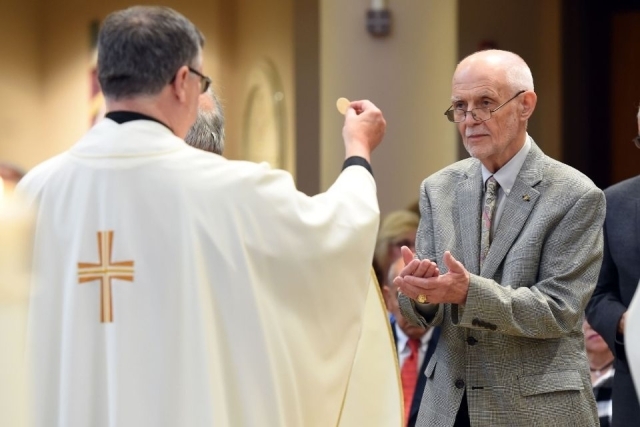
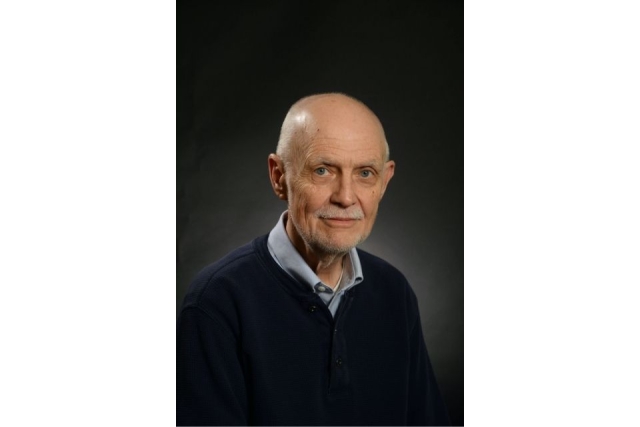
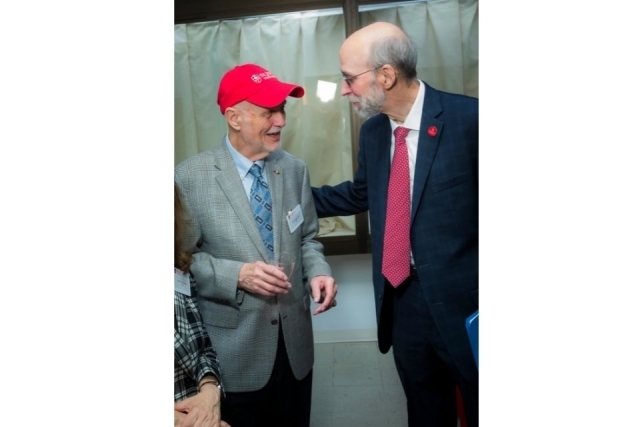
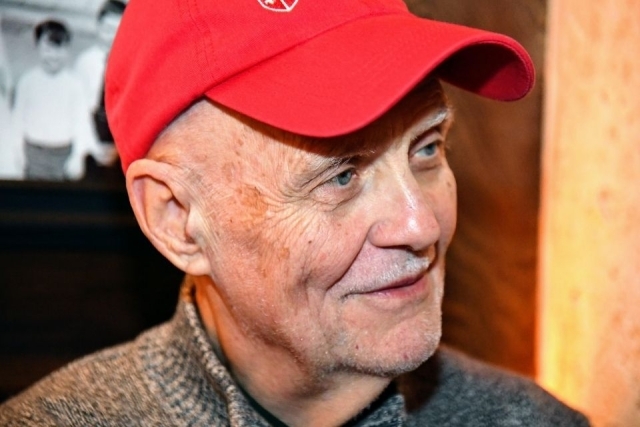
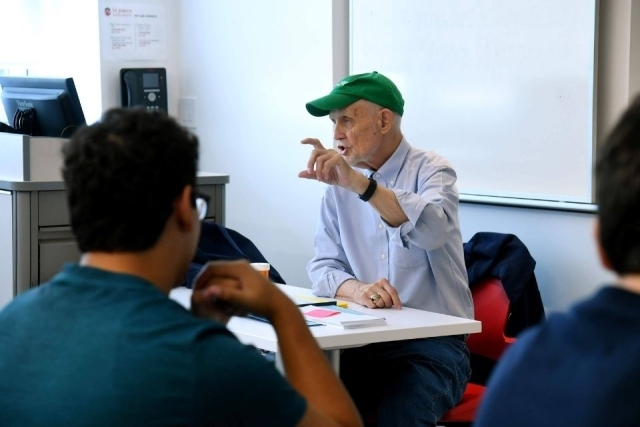
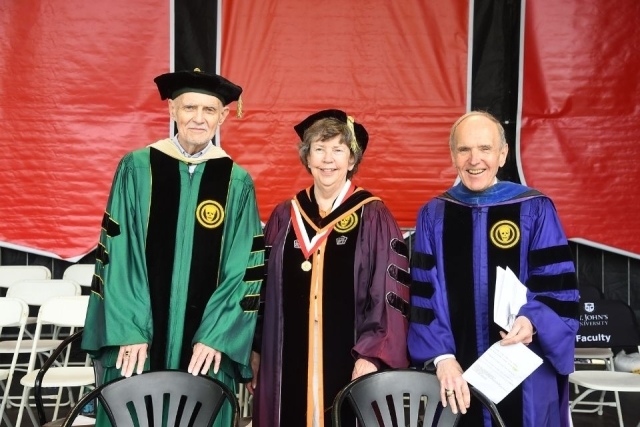
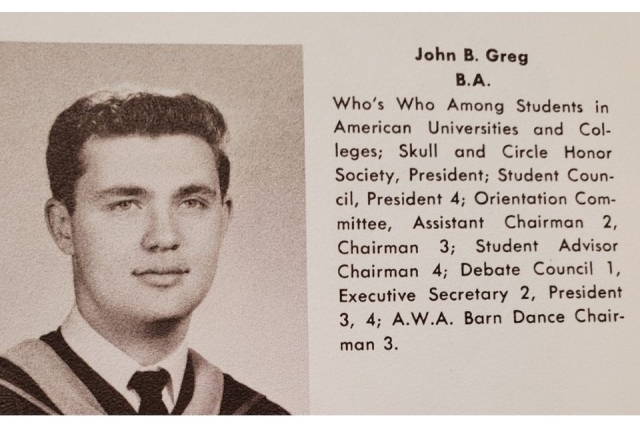
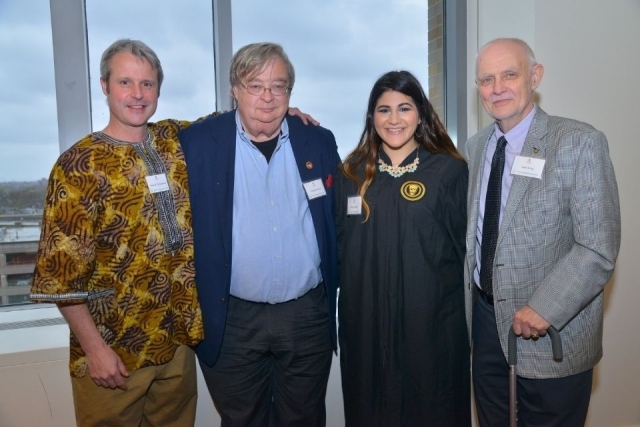





















St. John’s University mourns the passing of John B. Greg, Ph.D. ’62C, retired Associate Professor, Speech and Rhetoric, St. John’s College of Liberal Arts and Sciences. He was a dedicated alumnus, and a brilliant, devoted professor who, over a memorable career that spanned a half-century, taught generations of St. John’s University students the art of speaking and writing effectively. John was an integral and beloved member of the St. John’s family who embodied the University’s values and mission.
The official cause of death was renal failure combined with a diagnosis of early Alzheimer’s and repeated bouts of cancer, but to those closest to him he simply lived to teach—and when he stopped teaching, he ultimately stopped living. John was 80 years old.
“Everyone knew John and loved him. He was a citizen of St. John’s,” remarked Joseph Sciame ’71Ed, Vice President of Community Relations, who first met him when they were first-year undergraduates.
They remained friends and colleagues over the next six decades. Lifelong friends are rare, but John had many that were cultivated across the varied campus constituencies that he deftly and happily traversed.
Born to Hungarian immigrants, John and his late sister, Marie (Twomey), were raised in Astoria, Queens. He attended St. John’s Preparatory High School (aka “the Prep”) and began a lifetime relationship with the Congregation of the Mission (the Vincentians) that would be the guidepost for his personal and professional life. As a high school student, John became involved in competitive speech and debate and found his true voice—a voice that he would use to make his life’s work to help others find and craft their own.
John Sexton, J.D., Ph.D., President Emeritus of New York University (NYU), Dean Emeritus of NYU Law School, and Benjamin Butler Professor of Law, was a student at the Jesuit-run Brooklyn Prep when he first encountered a young John Greg. Both boys were skilled high school debaters on the New York City forensics circuit in the late 1950s.
“It was clear more than 60 years ago that John was among those gifted with talent to make an impact,” said Dr. Sexton. “In the world of high school debate, where we became friends, he was a star—an opponent to be feared and admired at the same time. He set a standard; we tried to meet it. His life as a teacher extended that role over decades in the lives of thousands.”
After entering St. John’s University in the Fall of 1958, John quickly immersed himself in campus life inside and outside of the classroom. As an engaging, accomplished, and popular student, John would eventually become the President of Student Union and was the Head Skull of St. John’s College’s Skull and Circle Honor Society—two organizations at the University he would long champion.
Upon completing his undergraduate studies, John left Queens for Detroit, MI, and Wayne State University, where he earned a Master of Arts degree and a Ph.D., and where he served as a professor and an award-winning varsity debate coach. The stories of him driving students across the upper Midwest during long, harsh winters to compete in forensics tournaments under his tutelage were legendary. It took him almost nine years to complete his Ph.D. because he enjoyed teaching and coaching so much that he delayed his dissertation.
“I thoroughly enjoy teaching. I am a happy man when I am in the classroom,” he would humbly profess for a “Humans of St. John’s” feature story on his long and illustrious teaching career.
In September of 1972, John returned—almost by accident—to St. John’s. He had turned down full-time teaching positions to teach elsewhere, and instead opted to accept a job as a debate coach at his alma mater. He soon began teaching and became a full-time professor. John served the University with distinction until declining health led to his retirement in 2020.
At St. John’s, he taught varied Speech and Rhetoric courses, most notably Argumentation, Persuasive Speaking, and Decision-Making. He served as Assistant Director and later as Associate Director of Forensics, and coached countless students to become better speakers, thinkers, readers, writers, performers, and people.
As a professor and coach, John took a personal interest in the individual preparation and performance of thousands of students, and mentored multiple generations of students for the rigors of public speaking in a tradition of excellence inside and outside of the classroom. John taught in the Honors Program since its inception, and devoted his time and talent to many departmental and University-wide committees that shaped the direction of St. John’s University.
Public speaking is frequently cited as people’s biggest fear. Ever mindful of that, John often taught that sometimes the only thing that stands between the ability to express oneself to an audience is overcoming that fear. He ably taught thousands of students to conquer their fears, and in so doing, changed the trajectory of their personal growth and career success.
In higher education, some believe that the intellectual cohesion of what a professor says is sufficient, and that the skills in communicating course material are of lesser importance. John did not subscribe to that train of thought. Rather, his mantra was lecturers must not only instruct—they must also be able to inspire, impress, and entertain. These rhetorical devices help to engage the student and make the subject matter memorable.
Sr. Maura Hobart, D.C., arrived at St. John’s University in 1974 and immediately became fast friends with John. She was with him hours before he passed.
“John was so generous to so many for so long,” she recalled.
Recounting how he was an original member of the University’s Sunday Mass community since its inception, and that he had a regular worship spot in Our Lady of Lourdes Chapel and later St. Thomas More Church, she added: “A faithful friend is a sturdy shelter, and his lifelong friends are forever blessed in knowing that they had one in John.”
A gracious person guided by his Catholic faith, for years John helped train lectors to proclaim the sacred scripture with splendor and glory. He taught homiletics and worked with international members of the clergy to improve their communication skills. His personal generosity and consistent philanthropy to varied charitable organizations—always done in a quiet and unassuming way— matched the dignity and demeanor by which he always carried himself.
His Vincentian credentials were unmatched. For years, John taught courses to inmates at the Arthur Kill Correctional Facility on Staten Island, NY. He was active in the work of the Vincentian Service Corps through his mentoring. John also served as a Board member of St. John’s Bread and Life, working to provide food and support to the hungry and needy, as well as to those at the New Horizons Adult Education Center.
So dedicated was he to the principles of service to the poor and those in greatest need that he was named an affiliate of the Daughters of Charity—a rare distinction among members of the laity. He earned many accolades over the years, including the Vincentian Mission Award and the President’s Medal; he was twice honored as Teacher of the Year.
As an undergraduate, Brian Browne ’93C, ’97G, Executive Director for University Relations and Assistant Vice President for Government Relations, was a frequent student of John’s. He continued to learn from his counsel for years, recalling one memorable moment.
“After the sudden and unexpected passing of our colleague, Pamela Shea-Byrnes, D.Min. ’86SVC, ’90G, I was asked to deliver the Call to Worship at a memorial Mass that celebrated her life. I summoned everything that John taught me to prepare and deliver my remarks, and when I returned to the pew, head bowed, I looked up and from across St. Thomas More Church I caught eyes with John. He smiled and nodded approvingly, and at that challenging moment, that was what I needed most.”
“Ever the teacher and always the supportive friend, he was truly special.”
John was the voice of countless special University events, lyrically intoning citations and reciting the names of thousands of graduates during Commencement ceremonies—an underappreciated task that he approached with diligence and determination—hallmarks of all that he did at St. John’s. For years, he would set up a table during cap and gown distribution so that he could personally meet every graduate and learn how to phonetically pronounce their names.
“It is my privilege to proclaim the names of our graduates; it is my obligation to do so correctly,” he remarked.
Jennifer Johnson, John’s niece, shared her experience of life with “Uncle Johnny.” “He was the cornerstone of the family, always generous with his time. His giving knew no bounds. As a family, we loved to play cards. Whenever Uncle Johnny came to visit, he was always up for a game that often extended into the weekend.”
“Our Uncle was the steady constant in our family; he supported us in more ways than one, and taught us life lessons demonstrated by his bottomless reservoir of good will. He nourished us in many ways—as a child, that meant Carvel ice cream—but as we grew older, he sustained us with his example and the premium that he placed on quality time with family and friends.” A gifted storyteller and always the life of the party, he sang, played the piano, and even the accordion—until it was stolen from his off-campus Union Turnpike apartment.
Ms. Johnson recounted the challenge of helping to clean out his campus office and the nearby apartment. “His office and home were a testament to his unwavering commitment and service at St. John’s. He loved the University, and regularly spoke of his students and his concerns and deep respect for them.”
He kept years of records and paper files that documented a half-century of the teaching and learning of his students, and personal notes written by and about them. Whenever he was asked to write a recommendation letter, John always personalized each one and made a point of assiduously doing so. A prolific reader, his bookshelves were lined with dog-eared textbooks, mystery novels, and historical biographies that he often loaned to friends.
Frank Le Veness, Ph.D., Professor, Department of Government and Politics, was one such longtime friend, colleague, and meal companion of John Greg. “What a terrible loss for St. John’s,” he said. “John was a great teacher with deep, abiding care for the University, our students, and the Vincentian community. He practiced what he preached. He cared about the Vincentian mission and he cared about the Vincentians; he befriended generations of them and the students entrusted to their care.”
Dr. Le Veness continued, “John was a longtime and active member of the American Association of University Professors, serving on the Executive Committee, and he was always interested in the welfare of people. He sought equity for everybody, and was willing to give up money for the betterment of others. John was a warm, friendly, and caring individual who was always upbeat, despite whatever circumstances he was in. He was a dear friend, and I will miss his comradery and fellowship. John and I, along with John P. “Jack” Clarke, Esq. ’55CBA, ’57L, Professor, The Peter J. Tobin College of Business, regularly attended Sunday Mass together—and followed it with brunch that would extend well into Sunday afternoon. What happy times we had together.”
Describing the students at St. John’s whom he taught, coached, and inspired for almost 50 years, John once shared, “There is humility about the kids that we get here. Some are very bright, but I’ve never felt that they thought they were entitled. They work hard. The diversity is an extraordinary thing.”
Tearfully recalling the final months of a life well-lived by her Uncle, Ms. Johnson decried the painful reality of Alzheimer's disease and how it gradually takes away the person you know and love. “For our Uncle Johnny, it took away one of his greatest assets—his sharp mind and clever wit. This was a man who 20 years earlier beat back a stage 3 diagnosis of pancreatic cancer, only to be sidelined by this.”
But what can only be described as his unique rallying moment, John had one more St. John’s connection to make. In his final hours, a priest from nearby St. Lawrence O’Toole Church in Brewster, NY, was called to administer the Sacrament of the Anointing of the Sick. After exchanging bedside pleasantries, the St. John’s connection was quickly made.
Rev. Richard Gill and seminarian Joseph Ukaj, who accompanied him on the sick call, are alumni of St. John’s University. Largely unresponsive in his final hours, John reacted to the call to prayer by making the sign of the cross. The last voice, the final prayer ever heard by the longtime professor of speech, was the spoken word of a St. John’s graduate. Could there be a more fitting end to John B. Greg’s St. John’s story?
John is survived by his niece, Jennifer Johnson, and his nephew, Scott Twomey. A memorial service to celebrate his life and legacy is planned for a later date at the Queens, NY, campus of St. John’s University.
Donations—in his name—may be made to the Daughters of Charity, c/o Sr. Maura Hobart, 96 Menands Road, Albany, NY 12204, or to any charitable organization embodying the Vincentian ideal of service that guided his entire life.
Expressions of sympathy may be sent to Ms. Jennifer Johnson, 78 Allview Avenue, Brewster, NY 10509.
